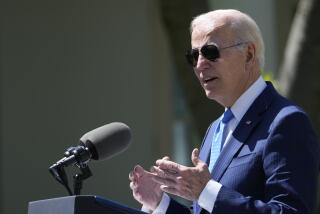Report Cites Lower Pay, Nearly Equal Tax : Economy: Bentsen pushes for a break for the middle class. The Congressional Budget Office also finds a huge cut in levy on the wealthiest.
- Share via
WASHINGTON — A typical American family with children will have lower earnings next year than it did in 1980 but will pay almost as much in federal taxes, a Congressional Budget Office report showed Wednesday.
In contrast, the wealthiest 1% of families--those earning more than $320,000 a year--will pay an average of $16,400 less in taxes in 1992 than they did under laws in effect a decade ago, the CBO study said.
Sen. Lloyd Bentsen (D-Tex.), chairman of the Senate Finance Committee, cited the report in pressing for middle-income tax relief on the eve of renewed Senate hearings on tax legislation to deal with a sluggish economy.
The CBO estimated that the median family income for families with children will be $37,300 next year, or $29,500 after all federal taxes are paid. In comparable dollars, 1980 income was $38,900, or $30,900 after federal taxes.
Despite the drop of $1,600 in total income, however, the CBO report indicated that the most typical middle-income family would pay only $200 less in taxes than it did in 1980.
But taxes for the wealthiest were cut dramatically in the 1980s. A family with earnings of $567,000 would pay $16,400 less in federal taxes in 1992 than it owed under laws in effect in 1980, Bentsen said.
“The study confirms my belief that middle America was victimized by the economic policies of the ‘80s and reaffirms my conviction that these families are entitled to tax relief denied them in the decade just past,” Bentsen said in a statement.
He has proposed a $300 tax credit for every child under 19 that would cut federal income taxes by as much as 25% for a family of four with earnings of $35,000 a year, to be paid for by reductions in military spending.
In a related development, President Bush said the public is tired of bickering between the Democrat-controlled Congress and the White House over tax proposals and just “wants us to get the job done.”
White House Press Secretary Marlin Fitzwater said the President told his Cabinet that the nation is in a very slow period and that this sluggishness would be reflected in economic statistics that will be made public in January.
Bush signaled that he would include his controversial plan to reduce capital gains taxes, along with new proposals, in a tax package that he will present to Congress next month in his State of the Union address.
“I believe Congress will act . . . . Let’s get on with it,” Bush said at a Republican fund-raising lunch.
A new Cable News Network-Gallup poll, however, indicated that the public is unhappy with Bush’s handling of the economy by a margin of 3 to 1. A total of 73% disapproved and 22% approved of the way the President has dealt with the feeble recovery.
Meantime, a prominent business organization and two leading economists declared their opposition to tax cuts as a way of spurring recovery and urged Congress and Bush to resist growing political pressure to do so.
Testifying before the House Budget Committee, spokesmen for the Committee for Economic Development said major tax cuts or spending increases at this time would damage the economy in the long run by raising the federal budget deficit and reducing economic growth.
“To enact such measures for political reasons would be economic folly,” said an organization report presented by Roy Ash, who was federal budget director in the Richard M. Nixon Administration, and Dean Phypers, chairman of the business group’s research and policy committee.
Harvard economist John Kenneth Galbraith also argued against a tax reduction to speed recovery from the recession, saying: “This is foolish, even mildly insane.” But Galbraith endorsed a major federal public works program and substantial grants or loans to states and local governments to help put people back to work, even if these outlays increase the deficit temporarily.
Dr. Roger E. Brinner, executive research director of DRI/McGraw-Hill in Lexington, Mass., rejected tax reductions for middle-income Americans, saying: “The nation can’t afford them . . . . Most taxpayers and investors will view such cuts cynically, as short-sighted attempts to please voters in an election year.”
Brinner advocated a tax credit on business purchases of equipment that he said would stimulate the economy and perhaps even pay for itself. The problem, he said, is a “crisis of confidence” that is not justified by the underlying realities.
More to Read
Get the L.A. Times Politics newsletter
Deeply reported insights into legislation, politics and policy from Sacramento, Washington and beyond. In your inbox twice per week.
You may occasionally receive promotional content from the Los Angeles Times.








